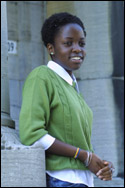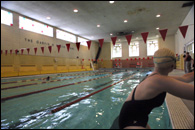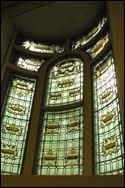Kaleidoscope
 Owen Egan
Owen Egan |
|
Betty Angwenyi: Student of serendipity
For an international student to attend McGill, there are a few requirements. Good marks, a dose of wanderlust, a dollop of inner strength to withstand the stresses of being thousands of miles from home, and funding. Sometimes the families can afford to send their children to university, others turn to bursaries and loans, and occasionally--very occasionally--plain old luck plays a role.
As do many international students, Betty Angwenyi of Nairobi, Kenya, was using the Internet to do research on the website of the American Colleges & Universities magazine, www.acuinfo.com, when a window popped up offering a chance to win a $10,000 (US) scholarship, applicable to any member university. She filled out the form and forgot about it.
Then she won it.
"My mother was so happy," says Angwenyi. The money would go far to relieve the family finances. "I got the scholarship not because I'm a superbrain or anything, it was just luck of the draw," she says.
"I knew I wanted to study overseas--I'd like a change, I'd been there all my life. Many of my friends are back at home, but you have to meet new people, do new things," says the adventurous Angwenyi, who's now wading through mid-term readings for her BCom.
During her A-level studies, she thought of going to England, but someone said that "in England it's always raining, it's just stopped raining, or it's just about to rain." Then she considered South Africa, and Australia, even Sweden. But her family members had studied in America, and loved the ethnic variety and quality of education in the States.
Fast forward to spring. Angwenyi was exhausted after finishing five applications to American schools, when a friend recommended, "you better apply to McGill." Angwenyi laughs, "I feel I applied first, then picked up the prospectus." She liked what she saw, and months later, chose to put the money on Montreal.
"I'm interested in finance, but maybe I'll go into information systems, or financial accounting--my mind is open." Afterwards she says she'll go back to Kenya, but finds Canada "excellent."
Angwenyi has jumped feet first into the McGill community. She plays squash every Thursday, has auditioned for a play, and hopes to work on a new CKUT radio show.
At home she also did volunteer work for a home for street children and orphans. "It was eye-opening. Those kids have so little, yet they're always so cheerful. I can be so selfish: I complain, I gripe, I moan. These kids are almost in tatters, but a dip in the pool keeps them on wings all week. Even the warmth between them… When they play soccer they never get competitive to the point of hatred."
Angwenyi lives in a Catholic residence with about a dozen other women--from Quebec, France, Nicaragua, an Arabic woman from Denmark, a Canadian from Venezuela. "You should hear the house--so many languages are spoken there!" she says. "At first I complained about [not getting into McGill residence], but it worked out for the best. It's a beautiful house."
And does she like Montreal? "I love it, the city rocks," she says. "There's so much variety--I've never ever felt like a stranger. Everyone's friendly."
Her image of North American downtown cores has been changed by Montreal's laid-back charm. "I expected hustle, bustle, noise--but even on a Monday morning it's calm. It's spacious and there's not much pollution." She laughs, "Here there's no dust! In Nairobi when it's dry, all the dust comes out from god knows where.
"People say the world is a small place, but it's a big place as well." At McGill, Angwenyi finds that "even within your own class, you don't know everyone. Every day you're able to talk to someone new." She revels in this change from her small college. "When in a tiny set-up, everyone's a copy of someone else. But here, no way! You're free to be yourself, style-wise."
Angwenyi finds that people here put a lot of emphasis on time, and are sometimes too rushed for more than a brief chat. Back home, her mother always stressed the importance of taking the time to talk to people.
"You talk to people on campus and they're from all over the world--you get to know things spontaneously. You gain a lot, a lot more than you lose."
 |
||||
|
George's books and their non-conventional wisdom are a great contribution to this country….When you do the unexpected, you make a difference, and George always argued differently--especially for the rights of French Canada, which wasn't a popular thing to do at the time. |
||||
Foundations
Weston Pool
 Owen Egan
Owen Egan |
|
The Strathcona Building, which houses the Faculty of Music, contains a warren of rooms for students to work on their vibrato, breathing, and correct posture for their instrument. A few even work on hardier physical efforts in the building's Garfield Weston Pool, added to Strathcona at the same time as the Reynolds Wing in 1948-49.
The pool looks like many others of mid-20th century vintage that dot Montreal--plain white tiles, 25 yards long, five lanes to swim in. Yet it has what must be the best windows in the swimming pool community. At the south, opposite the diving board, there are stained glass windows that were formerly in the dining room of Lord Strathcona's residence, 1157 Dorchester St. West, demolished in 1941. Cupids bracket lead-framed clear panes that let in light for happy splashers and water nymphs.
The ladies' changing rooms are low ceilinged and carpeted. A plaque above their entrance reads "In honour of Ethel Mary Cartwright, 1906-1927 [the years she taught at McGill], who devoted her tireless efforts and forceful personality to deepening and widening the scope of physical education for women, whose vision and sincere belief in her profession led to the establishment of the first university school of physical education in Canada."
Cartwright, or "Carty" as she was affectionately known to the students, helped found McGill's School of Physical Education at Royal Victoria College. She emphasized "physical training," not "physical straining," and assured the women students that yes, it's possible to be feminine and graceful even if you're a demon in the hockey rink.
 Stained glass windows in the Weston Pool
Stained glass windows in the Weston PoolOwen Egan |
|
Cartwright would put on athletic demonstrations at the gym, and one evening's performance included "marching, rhythmic dancing and, piece de resistance, the twirling of electrically illuminated Indian clubs."
Smart enough not to use anything electric in water, the McGill Synchro Club, until recently, practiced their own rhythmic dancing and other fancy synchronized swimming moves at Weston Pool. There is a dedicated core of members who use the pool--locals, students, staff--who don't want to walk up the hill to the newer Memorial pool.
"The Weston is dark, old, has a certain charm," says Jill Barker, coordinator, athletics and fitness. "Those who use it, love it. They appreciate the character of the place, its eccentricities. It has a very homey, family kind of ambience."
Soon, chlorinated waves will be replaced by sound waves. State-of-the-art multimedia studios will take the place of Weston Pool, as the site will be used for the new Centre for Interdisciplinary Research in Music Media and Technology.
 |
||||
|
I assure you, with all my honour as a McGill professor, that there will be no frogs raining down from the heavens. |
||||

